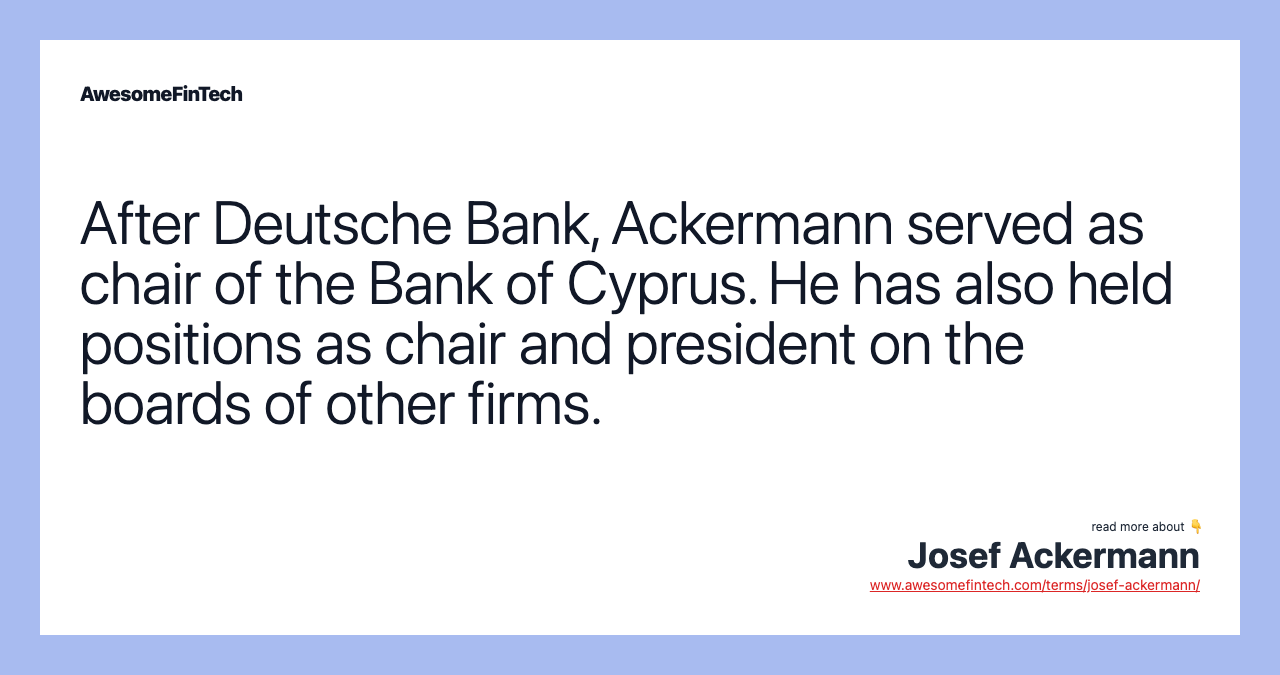Josef Ackermann
Josef Ackermann (1948- ) is a Swiss banker who served as CEO and chair of Deutsche Bank (2002-2012). Ackermann served as CEO of Deutsche Bank from 2002 to 2012, following CEO Rolf Breuer, who tasked Ackermann with making Deutsche Bank a global investment bank. Positions he has held include: Second Deputy Chair of Siemens AG Non-Executive Director of Shell President of the Board of Trustees for the St. Gallen Foundation for International Studies President of the Board of Patrons of the Institute for Corporate Culture Affairs Chair of the Board of Directors of the Institute of International Finance Chair of the Board of Directors of the World Economic Forum Non-Executive Director of Vodafone from 2000-2002. After many disagreements with the CEO of Credit Suisse on the direction of the firm, Ackermann left and eventually joined Deutsche Bank as a member of the board. After Deutsche Bank, Ackermann served as chair of the Bank of Cyprus.

Who Is Josef Ackermann?
Josef Ackermann (1948- ) is a Swiss banker who served as CEO and chair of Deutsche Bank (2002-2012). From 2014-2019, he served as chair of the Bank of Cyprus. He has also served as a member of the Group of Thirty (G30), a Washington, D.C.-based group of top international economists and financiers. He also held a seat on the steering committee of the Bilderberg Group.







Understanding Josef Ackermann
Born in Walenstadt, Canton of St. Gallen, Switzerland in 1948, Josef Ackermann attended the University of St. Gallen, where he studied economics and social sciences. Upon completing his undergraduate studies, Ackermann remained at the University of St. Gallen as a research assistant with the Department of Economics; he eventually earned his Ph.D. in economics. Early on, he was encouraged to go into both academic and military careers, during and after his education as well as from his time in the military, but he began his career as a corporate banker with Credit Suisse in 1977.
Ackermann quickly rose through the ranks at Credit Suisse, where he was eventually promoted to General Director in 1990, thereby becoming a member of the board. He became President of the executive board in 1993. After disagreeing with then CEO, Rainer Gut on a variety of areas, Ackermann left Credit Suisse.
Ackermann landed at Deutsche Bank as a member of the board of directors, spearheading many mergers and improving global operations. Ackermann served as CEO of Deutsche Bank from 2002 to 2012, following CEO Rolf Breuer, who tasked Ackermann with making Deutsche Bank a global investment bank.
Throughout his tenure at Deutsche Bank, Ackermann was faced with many legal troubles related to the bank's business, primarily in misleading investors about the quality of subprime mortgages that contributed to the Great Recession. Other changes occurred throughout his time at the bank, such as breaches of trust. Ackermann avoided any jail time but many cases were settled out of court.
Deutsche Bank has also become notorious for its relationship with Donald Trump and the loans made to his businesses, however, this was in the 1990s, before Ackermann's time at the bank.
Other Positions Held by Ackermann
Ackermann has served on the boards of Bayer, Deutsche Lufthansa, Linde, Mannesmann, Siemens, Zurich Financial Services, and Royal Dutch Shell. He has also been a visiting professor of Finance at the London School of Economics and a visiting professor at Johann Wolfgang Goethe University. Positions he has held include:
Related terms:
Who Is Alan Greenspan? How long was Greenspan Fed chair?
Alan Greenspan was the 13th chair of the Federal Reserve, appointed to an unprecedented five consecutive terms between mid-1987 and early 2006. read more
Barry Diller
Barry Diller is the long-standing senior executive and chair of the board of media company IAC/InterActiveCorp. read more
Chief Executive Officer (CEO)
A chief executive officer (CEO) is the highest-ranking executive of a firm. CEOs act as the company's public face and make major corporate decisions. read more
Who Is Daniel P. Amos? What Is Aflac?
Daniel P. Amos is the chair and CEO of insurance company Aflac. read more
Economics : Overview, Types, & Indicators
Economics is a branch of social science focused on the production, distribution, and consumption of goods and services. read more
Group of 30 (G-30)
The Group of 30 (G-30) is a group of economists, bankers, and other leaders from the public and private sector who meet to discuss global economics. read more
The Great Recession
The Great Recession was a sharp decline in economic activity during the late 2000s and was the largest economic downturn since the Great Depression. read more
Investment Banking
Investment banking is a specific division of banking related to the creation of capital for other companies, governments, and other entities. read more
Who Is Kenneth I. Chenault? Who Is the CEO for American Express?
Kenneth I. Chenault is a former chair and CEO of American Express read more